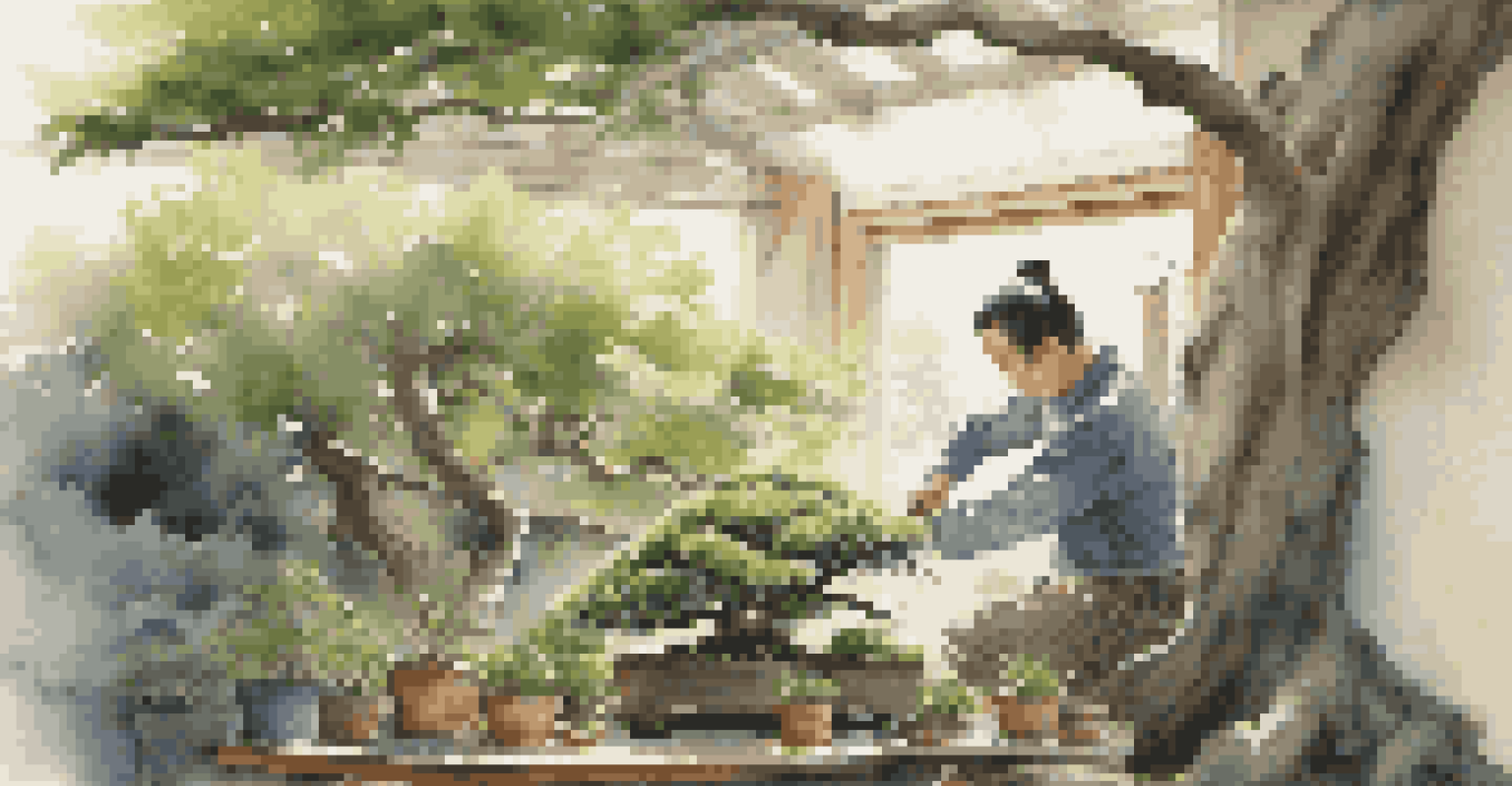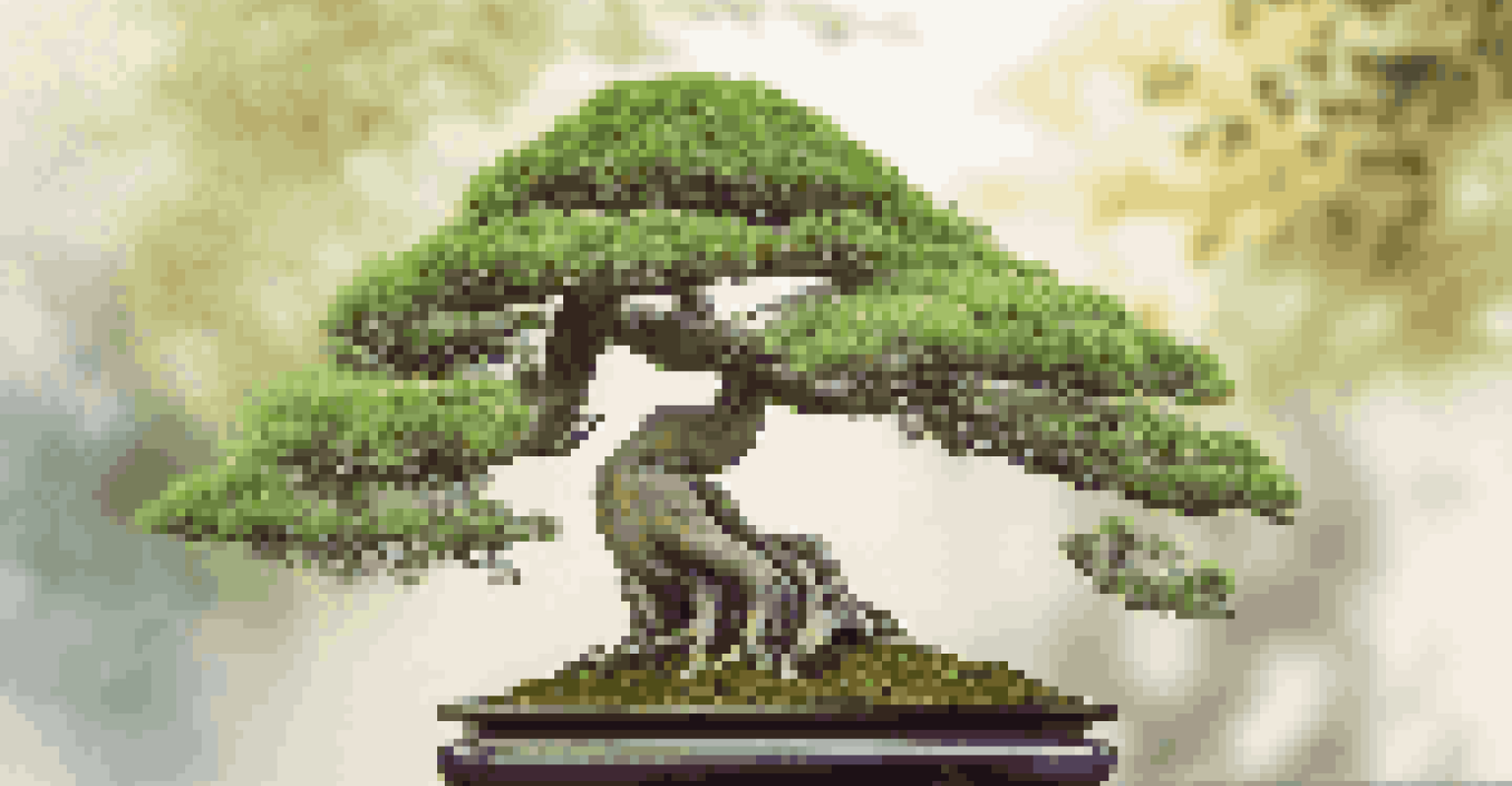Bonsai and Nature: Connecting with the Outdoors Through Care

Understanding the Essence of Bonsai
Bonsai is more than just a miniature tree; it's a living art form rooted in centuries of tradition. Originating from ancient China and later refined in Japan, bonsai embodies the philosophy of harmony between nature and human creativity. By cultivating a bonsai, individuals engage in a mindful practice that encourages appreciation for the natural world around them.
The creation of a bonsai is a reflection of the relationship between nature and the artist.
The process of growing a bonsai tree requires patience and dedication, reflecting the intricate balance of nature itself. Each tree tells a story, shaped by the careful hands of its caretaker, echoing the resilience and beauty found in nature. This connection creates an avenue for mindfulness, allowing caretakers to reflect on their own lives while nurturing their trees.
Moreover, bonsai care invites enthusiasts to explore the outdoors, as sourcing materials like soil and stones becomes part of the journey. Each element gathered from nature adds to the unique story of the bonsai, reinforcing the bond between the artist and the natural environment.
Bonsai as a Mindful Practice
Caring for bonsai is a practice steeped in mindfulness, encouraging individuals to slow down and be present. The act of pruning, watering, and shaping each tree requires focus and attention, fostering a meditative state that many find therapeutic. This mindful engagement helps reduce stress and anxiety, promoting overall well-being.

When tending to a bonsai, the caretaker learns to observe subtle changes, both in the tree and their own thoughts. This observation cultivates a deeper connection with nature, as they become attuned to the rhythms of growth and decay. Just like nature, life has its cycles, and bonsai care highlights the beauty in these transitions.
Bonsai Cultivation Enhances Mindfulness
Caring for bonsai encourages individuals to slow down and engage in a mindful practice that promotes well-being.
Additionally, this mindful practice often leads to a greater appreciation for the environment. As bonsai enthusiasts take time to reflect on their trees, they may become more aware of the natural world around them, inspiring them to protect and cherish it.
The Environmental Benefits of Bonsai
Engaging with bonsai not only nurtures personal growth but also benefits the environment. By cultivating these miniature trees, enthusiasts contribute to urban greening efforts, improving air quality and temperature regulation in their communities. Every bonsai adds a touch of greenery, helping to combat pollution and enhance local ecosystems.
Nature does not hurry, yet everything is accomplished.
Moreover, bonsai cultivation promotes biodiversity. Many enthusiasts choose native species for their bonsai, which supports local flora and fauna. This conscious choice encourages a thriving habitat for various organisms, fostering a healthier ecosystem that reflects the interconnectedness of all living things.
As more people embrace bonsai care, the movement can lead to increased environmental awareness. This ripple effect can inspire individuals to take further action in their communities, whether it’s planting trees or participating in conservation efforts, creating a stronger bond between people and nature.
The Therapeutic Effects of Nature Connection
Spending time in nature has proven therapeutic effects on mental health. Engaging with bonsai allows individuals to immerse themselves in a natural setting, even if it's just in their backyard or a small indoor space. This connection can alleviate feelings of isolation and promote social interactions among fellow bonsai enthusiasts.
Research has shown that exposure to nature can enhance mood, reduce stress levels, and improve overall mental well-being. By caring for bonsai, individuals experience these benefits firsthand, as each interaction with their tree fosters a sense of peace and satisfaction. It's a beautiful reminder of the healing power of nature.
Bonsai Supports Environmental Health
Growing bonsai contributes to urban greening and biodiversity, enhancing local ecosystems and air quality.
Furthermore, bonsai communities often gather for workshops and exhibitions, creating a sense of belonging. These social connections, rooted in a shared passion for bonsai, can lead to friendships and support networks that enhance the therapeutic effects of nature engagement.
Bonsai as a Gateway to Outdoor Exploration
Cultivating bonsai can spark a desire to explore the great outdoors. As enthusiasts learn about the different species and care techniques, they often seek natural settings to observe trees in their natural habitat. This exploration nurtures a deeper understanding of the environment and the ecosystems that support these beautiful plants.
Many bonsai enthusiasts find themselves hiking through forests, visiting botanical gardens, or participating in nature walks. These experiences not only enrich their knowledge of tree species but also provide opportunities for mindfulness and reflection in beautiful settings. Each adventure reminds them of the intricate beauty of nature.
Additionally, outdoor exploration can inspire bonsai projects that replicate natural landscapes. By drawing inspiration from their surroundings, caretakers can create unique bonsai arrangements that reflect the beauty and diversity of the environment, reinforcing the connection between their art and the great outdoors.
Creating a Bonsai-Friendly Outdoor Space
Establishing a bonsai-friendly outdoor space enhances the experience of caring for these miniature trees. A dedicated area allows enthusiasts to work with their bonsai while surrounded by nature, fostering a deeper connection with the environment. Incorporating elements like natural stones and water features can create a tranquil atmosphere for both the caretaker and the trees.
Consideration of the local climate and sunlight is crucial when designing this space. Different species of bonsai thrive in various conditions, so understanding these needs encourages a successful growing environment. This thoughtful approach not only benefits the trees but also enhances the caretaker's relationship with nature.
Bonsai Reflects Personal Growth Journey
The processes involved in bonsai care mirror life's challenges, inspiring patience and resilience in personal development.
Moreover, creating a bonsai garden can serve as a gathering place for friends and family. Sharing this space allows for the exchange of knowledge, stories, and experiences, fostering a sense of community and connection to the outdoors that enriches the bonsai journey.
Bonsai Care as a Reflection of Personal Growth
Just as bonsai trees require careful attention and nurturing, so do our personal journeys. Each stage of bonsai care—pruning, shaping, and watering—mirrors the processes of growth and change we experience in life. This reflection can inspire individuals to embrace their own growth journeys with patience and resilience.
As caretakers witness the transformation of their trees over time, they can draw parallels to their own challenges and successes. This connection encourages a mindset of continuous learning and adaptation, reinforcing the idea that growth is a lifelong journey. Each bonsai becomes a living reminder of the beauty found in embracing change.

Ultimately, the commitment to bonsai care teaches valuable life lessons about patience, persistence, and the importance of nurturing relationships—both with nature and within ourselves. As caretakers forge deeper connections with their bonsai, they also cultivate a greater understanding of their own personal paths.